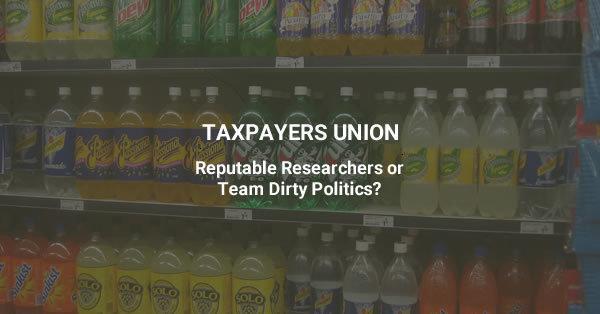Last year the Taxpayers Union launched a research report claiming that a tax on sugar-sweetened beverages wouldn’t have any impact. Apparently they had some numbers to back up that claim, although they didn’t make the data behind them public. That was not a good move.
Amidst a blaze of publicity they quizzed those that advocated for a soft drink tax whether they would reverse their stance in the face of this evidence.
It was a bold initiative. Especially given that it turns out they were wrong; either their analysis, data or both were incorrect. Not only has peer-reviewed research been published showing that the Mexican tax is working, but this research convinced a panel of experts from World Health Organisation (including our own Prime Minister’s Chief Science Advisor Sir Peter Gluckman) that a tax on sugary beverages is a good idea. In addition David Cameron’s government no longer is dismissing a sugar tax as not being in prospect in the UK. Even The Economist is convinced.
In light of this consensus of support for the corrective tax will the Taxpayers Union now retract their findings or will they cling to their unsubstantiated findings in the face of the evidence? At the very least they need to release their own evidence so it can be critiqued. They do after all promote themselves as a research house rather than an advocacy group. As we all know advocacy groups have a predilection of not letting the evidence get in the way of the ideology.
A misinformation campaign based on no evidence
The Taxpayers Union report of last July was apparently based on sales data from Mexico which the TU claimed had showed that following the imposition of the tax there was no shift in sales of sugary beverages.
We responded at the time pointing out five problems with their report, and suggesting that we should all wait until peer-reviewed research comes out to clarify what was really happening in Mexico. But instead of waiting, the TU backed their own findings and spent the rest of last year berating public health researchers who were advocating a tax on junk food or soft drinks in particular. Whale Oil was only too happy to lend its support to the TU findings, not exactly the most respectable of fellow travellers.
Six months after they published their report a study has come out clearly showing their research was just wrong.
What does the evidence actually say?
The researchers looked at actual sales data from a sample of over 6,000 households in Mexico. They found that the 10% tax reduced soft drink consumption over the year by 6%, but this had risen to 12% by the end of the year. For poor people the effect was even greater – reducing consumption by 9% on average but 17% by the end of the year. Consumption of untaxed beverages – especially bottled water – rose by 4%.
Incredibly the researchers had the same source of data that the Taxpayers Union used – Nielsen data. This is why the TU has to explain itself.
In short the soft drink tax is working – and the effect seems to be increasing over time. The reduction in soft drink consumption is highest amongst poorest groups, so the tax is considered by experts to be ‘pro-equity’. While the poor were a group that the TU report was particularly concerned about following the creation of a tax, this result suggests their concern was without cause.
This evidence has convinced the experts at the World Health Organisation that a tax on soft drinks is a key part of the battle of obesity. Indeed the experts think that a broader tax on junk food also seems worth exploring if a nutrition profiling system can be created (see Recommendation 1.2). The Morgan Foundation has been arguing for this for some time, and New Zealand already has a nutrient profiling system in place. It is far from perfect, but it is the ideal place to start.
As a result of this growing evidence, we are seeing the spread of soft drink and junk food taxes around the world. They are proving to be a crucial tool in the battle against fake food and obesity in countries like Hungary, Finland, and of course Mexico.
What can we learn from this?
In these days of social media and a short news cycle, reputation is crucial. It is easy to release a report and dominate headlines for a day or two. Debunking claims and waiting for peer-reviewed research takes time, and in the meantime claims can stand untested. It shows the need for the media and public to focus on quality, peer-reviewed research. Evidence may take time to emerge, but emerge it will.
It is time for the fledging Taxpayers Union to decide and declare what they are. You can’t dress up advocacy in bogus evidence and expect to get away with it. Will they heed their own advice and publicly retract their inaccurate report? Or will they instead show that they are no more than an advocacy organisation that is assembled to oppose taxation, simple as that? If the answer is the latter there will be no need to pay any heed to their future “research” reports.

